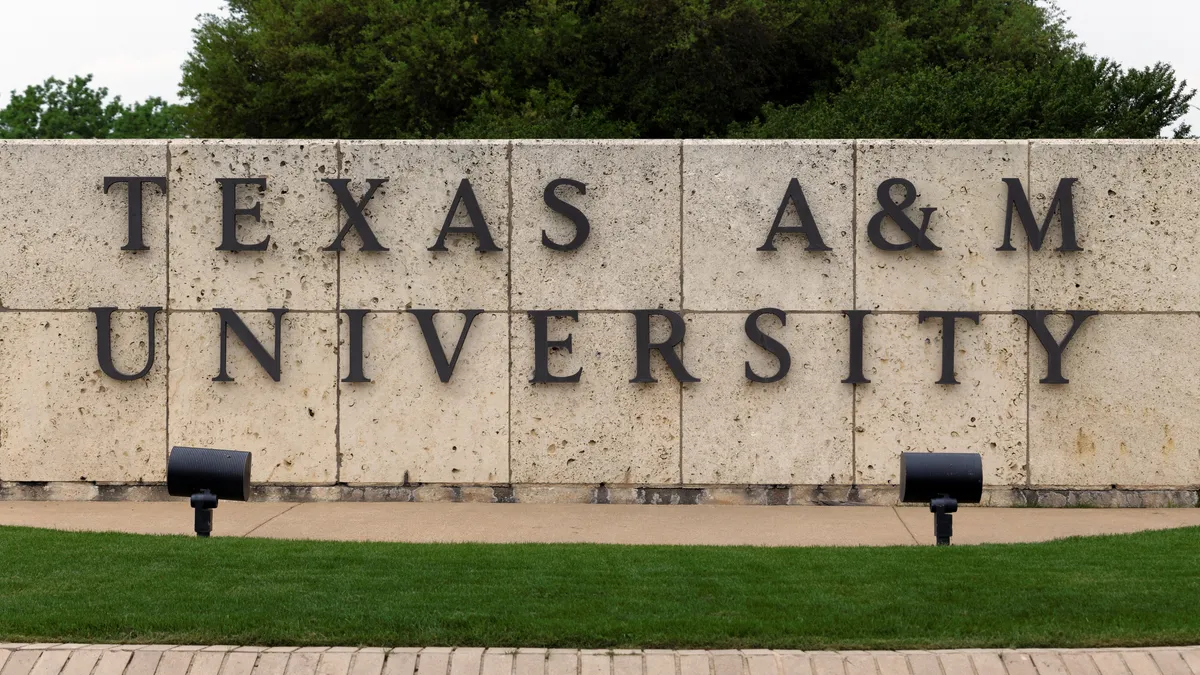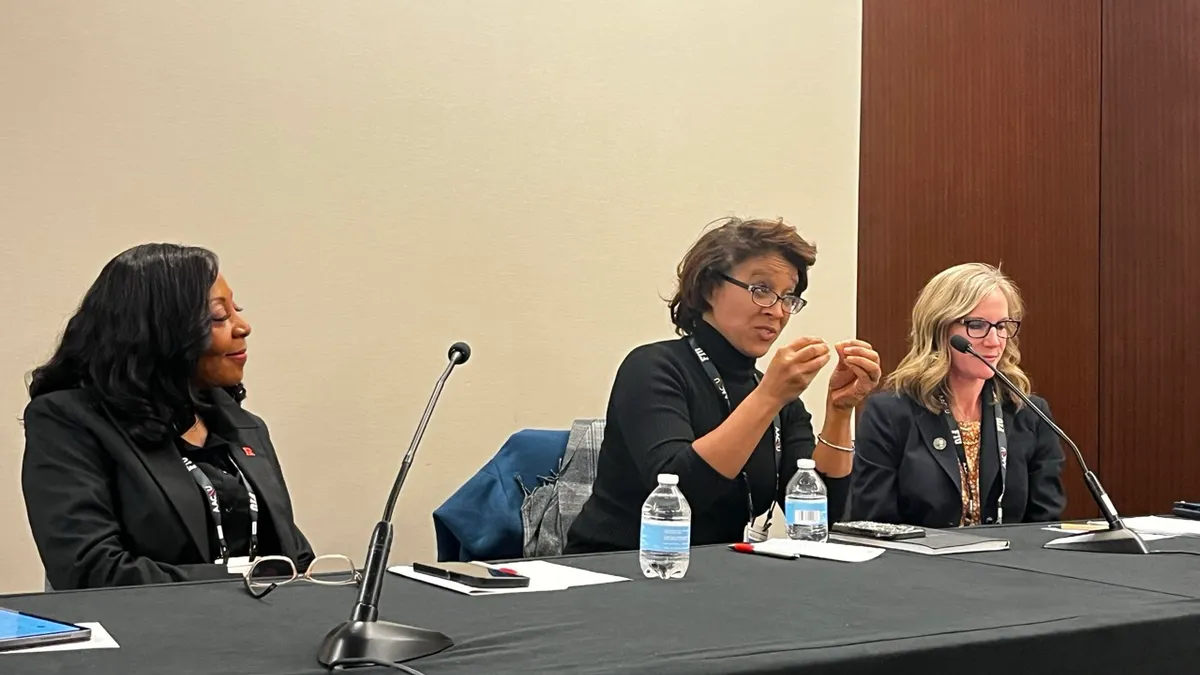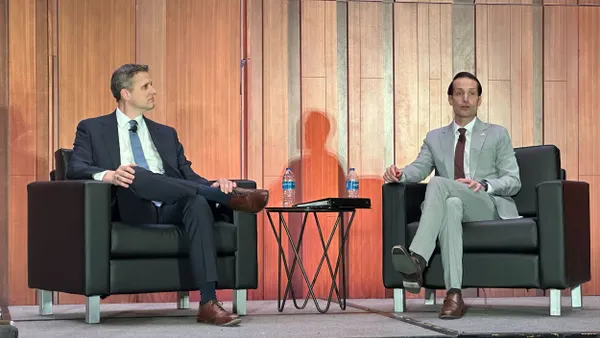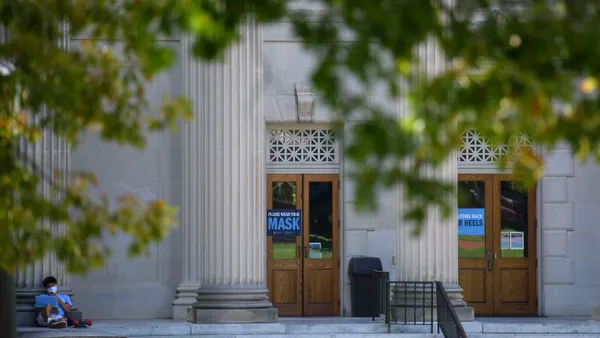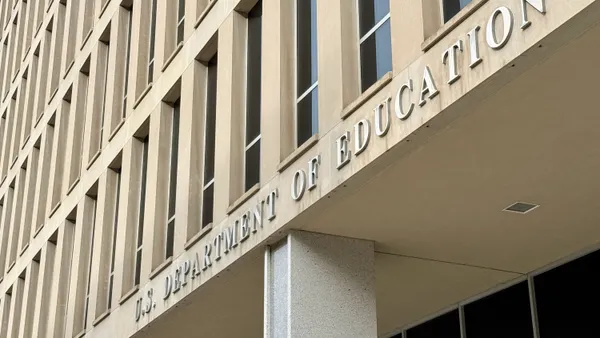Dive Brief:
- A Texas A&M University committee unanimously ruled last week that the public institution wrongly fired an English professor amid conservative furor over her classroom instruction on gender identity.
- The university terminated Melissa McCoul in September after a conservative state lawmaker shared a video of her teaching about gender and called for her to be fired. Texas Gov. Greg Abbott joined the lawmaker’s call to fire McCoul.
- On Nov. 18, the university's Committee on Academic Freedom, Responsibility and Tenure voted 8-0 that Texas A&M "had no justification for dismissing" McCoul and "failed to follow required procedures at multiple stages," according to a Sunday statement from the Texas A&M chapter of the American Association of University Professors.
Dive Insight:
In September, Texas State Rep. Brian Harrison posted a video to social media of McCoul teaching about gender identity in children’s literature and accused both her and Texas A&M of perpetuating “DEI and LGBTQ indoctrination.” Although Harrison didn’t name McCoul at the time and the video did not show her face, she was later confirmed to be the professor.
He called for both McCoul and then-President Mark Welsh III to be fired.
The university terminated McCoul just a day after Harrison’s social media posts. Welsh said she was fired for teaching coursework that did not match the class's catalog description.
“This isn’t about academic freedom; it’s about academic responsibility,” Welsh said at the time. “Our degree programs and courses go through extensive approval processes, and we must ensure that what we ultimately deliver to students is consistent with what was approved.”
Welsh ultimately stepped down as president later that month under political pressure, receiving a $3.5 million settlement from the Texas A&M University System’s governing board.
McCoul's firing quickly drew backlash from free speech and academic freedom groups, including PEN America, the Foundation for Individual Rights and Expression, the Texas American Federation of Teachers, and the Texas AAUP conference. They raised concerns about due process and accused the university of acquiescing to political pressure.
McCoul appealed her termination with the university soon thereafter.
A Texas A&M faculty council in late September determined that the university's decision to fire McCoul violated her academic freedom and that Welsh failed to follow university rules when dismissing her, according to The Texas Tribune. It also found that McCoul's syllabus was consistent with the corresponding course catalog entry and description.
But a senior Texas A&M administrator dismissed those findings in an October memo, saying the matter had not been assigned to the council and that the group had acted outside of its purview.
The administrator classified McCoul's firing as “largely unrelated to academic freedom" and said the council should not have reviewed the incident without the approval of the university’s Faculty Affairs office, according to the Tribune.
Last week, the university's Committee on Academic Freedom, Responsibility and Tenure — which reviews faculty appeals of dismissals — ultimately voted in McCoul's favor when reviewing her case.
The committee did not find evidence Texas A&M discussed its plans to fire McCoul with her, nor did it give her meaningful notice, according to excerpts of the decision shared by Texas A&M’s AAUP chapter.
CAFRT also disputed the university's assertion that McCoul was responsible for the alleged discrepancy between her class's course description and her instruction.
"The CAFRT committee found no documentary evidence that Dr. McCoul was included in discussions about the special topics course," it said. "More critically, Dr. McCoul does not have the authority to designate her own courses; it is the College of Arts and Sciences and the English department administration's responsibility to do so."
Texas A&M’s interim president, Tommy Williams, may either accept or reject the committee’s findings. McCoul will be reinstated if he accepts them, but her dismissal will be final if he rejects them, according to a university webpage detailing the process.
A university spokesperson said Monday that Texas A&M officials "are aware of the non-binding findings."
"Williams has received the committee’s report and will review it carefully before making a decision in the coming days or weeks," the spokesperson said in an email.
McCoul's lawyer, Amanda Reichek, told the Associated Press that Texas A&M appears poised to fight the committee's decision amid continued political pressure. The dispute, she said, seems headed for court.
“Dr. McCoul asserts that the flimsy reasons proffered by A&M for her termination are a pretext for the University’s true motivation: capitulation to Governor Abbott’s demands,” Reichek said in a statement.
Texas A&M’s AAUP chapter on Sunday called the university’s rationale to fire the professor "troubling and bizarre" and called for her to be reinstated, saying the university had "improperly shifted blame for its own repeated failures to follow established written policies onto Dr. McCoul."
"Dr. McCoul has a long and distinguished record of exceptional teaching and service to Texas A&M," the group said. "The vilification, trauma, and reputational harm she has endured at the hands of Texas A&M for simply doing her job must be acknowledged and corrected."
Last week's news comes after the Texas A&M system implemented significant policy changes related to the conservative contretemps around McCoul.
On Nov. 13, Texas A&M regents announced that none of the courses at the system's 12 universities “may teach race or gender ideology or topics related to sexual orientation or gender identity." To teach such topics, professors will be required to get advanced authorization from their institution's president.
The change similarly spurred outcry from academic and free speech advocates.


